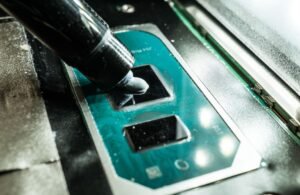AI Makeover
Artificial intelligence (AI) is revolutionizing various industries, from healthcare to finance, and now it’s making its mark in the world of beauty and cosmetics. With advancements in machine learning and computer vision, AI is becoming a crucial tool for makeup artists, skincare professionals, and customers alike. From virtual try-ons to personalized skincare recommendations, AI is transforming the way we approach beauty and giving us a whole new level of customization and convenience.
Key Takeaways:
- AI is reshaping the beauty industry by offering virtual try-on experiences and personalized recommendations.
- Machine learning algorithms analyze facial features and skin conditions to provide tailored skincare solutions.
- AI-powered chatbots offer instant beauty advice and product information, enhancing customer experience.
- The integration of AI in beauty devices allows individuals to achieve professional-level results at home.
One of the main applications of AI in the beauty industry is the development of virtual try-on experiences. Instead of going through the hassle of trying on dozens of lipstick shades or eyeshadows at a physical store, *AI-powered apps and virtual mirrors allow customers to see how different makeup products would look on their faces with a simple click*. These apps use facial recognition technology to accurately map features and provide a realistic preview of how the makeup would appear. This not only saves time and effort but also enables customers to make more informed purchasing decisions.
AI for Skincare
AI is not just limited to makeup but also plays a significant role in skincare. Machine learning algorithms analyze *facial features and skin conditions*, including wrinkles, acne, and dark spots, to recommend personalized skincare routines. By training on a vast database of images, these algorithms can identify patterns and correlations that humans might miss. This leads to tailored suggestions for products, ingredients, and routine modifications. By utilizing AI, individuals can optimize their skincare rituals and address specific concerns, resulting in healthier and more vibrant skin.
AI-powered chatbots are also taking the beauty industry by storm. These virtual assistants offer instant beauty advice and personalized product recommendations based on individual needs and preferences. By analyzing customer interactions and data, chatbots improve their responses over time. They can answer questions about specific products, ingredients, or even suggest makeup looks for different occasions. With their round-the-clock availability, chatbots provide convenient access to beauty expertise and enhance the customer experience by guiding and supporting them in their beauty endeavors.
Bringing Professional Results Home
With the integration of AI technology, beauty devices are becoming smarter and more efficient. AI-powered tools can capture images of the skin’s surface, analyzing factors like hydration levels, texture, and impurities. By using this information, they provide real-time feedback and tips for improving skincare routines. Some devices even come with built-in AI technology that automatically adjusts settings, ensuring optimal results for each user. These tools empower individuals to achieve professional-level outcomes in the comfort of their own homes, saving time and money on salon visits.
AI’s presence in the beauty industry is undoubtedly transforming the way we approach and experience beauty. From virtual try-ons to personalized skincare recommendations, AI offers a new level of customization and convenience. As technology continues to advance, we can expect further integration of AI in the beauty world, opening up endless possibilities for innovation and enhancing our beauty routines.
Table 1: AI-Powered Virtual Try-On Apps
| App Name | Features | Compatibility |
|---|---|---|
| YouCam Makeup | Virtual try-on for makeup, AR filters, beauty community | iOS, Android |
| ModiFace | Augmented reality makeup simulations, virtual hair dye | iOS, Android |
| Perfect Corp | Virtual makeup try-on, skin analysis, AI-powered beauty platform | iOS, Android |
Table 2: AI Recommendations for Skin Conditions
| Skin Condition | AI Recommendation |
|---|---|
| Acne-prone skin | Salicylic acid cleanser, oil-free moisturizer |
| Dark spots | Vitamin C serum, sunscreen with SPF 30+ |
| Aging skin | Retinol cream, hyaluronic acid serum |
Table 3: AI-Powered Beauty Devices
| Device Name | Features |
|---|---|
| Foreo UFO | Facial mask treatment, LED therapy, T-Sonic pulsations |
| NuFace Trinity | Microcurrent facial toning, red light therapy |
| PMD Clean | Sonic facial cleansing, anti-aging massage |

Common Misconceptions
1. AI is a Threat to Human Jobs
One common misconception about AI is that it will replace human jobs entirely. While it is true that AI can automate certain tasks and streamline processes, it is unlikely to completely eliminate the need for human workers.
- AI can enhance human productivity and efficiency in various industries.
- AI technologies often require human oversight and maintenance.
- AI is more likely to reshape jobs rather than replace them completely.
2. AI is Composed of Human-like Robots
Many people have the misconception that AI is synonymous with human-like robots. While AI can be integrated into robotic forms, it also exists in software applications and systems that do not have physical bodies.
- AI is diverse and encompasses various forms, including chatbots, recommendation algorithms, and autonomous systems.
- Not all AI technologies are embodied in human-like robots.
- AI can be present in software applications, virtual assistants, and data analytics tools.
3. AI Possesses Human-like Intelligence
Contrary to popular belief, AI does not possess human-like intelligence. Despite significant advancements in AI technology, current AI systems operate based on predefined rules and algorithms, rather than having consciousness or emotions.
- AI systems lack self-awareness and the ability to experience emotions.
- AI learns and makes decisions based on patterns and data, not human-like reasoning.
- AI functions through complex algorithms and mathematical models.
4. AI is Infallible and Perfect
Another common misconception is that AI is infallible and always produces accurate results. However, AI systems are subject to errors, biases, and limitations.
- AI systems can be biased, depending on the data they are trained on or the algorithms they use.
- AI systems may face limitations in unfamiliar scenarios or unexpected situations.
- AI needs continuous improvement and fine-tuning to enhance accuracy and robustness.
5. AI Will Take Over the World
Often portrayed in movies and popular culture, the misconception that AI will eventually take over the world and dominate humanity is not based on reality.
- AI technology is developed and controlled by humans, acting as tools to assist and augment human capabilities.
- AI is designed with specific purposes and functions, not with the intention of overpowering human beings.
- AI development is subject to ethical considerations and regulations to prevent misuse or harm.

Outperforming Humans: AI in Complex Gaming
Gaming has always been a competitive arena where players test their skills against each other. With the rise of Artificial Intelligence (AI), game developers have found a new way to challenge players by creating AI opponents. The following table showcases the record-breaking achievements of AI systems in various complex games.
| Game | AI System | Year | Achievement |
| Chess | Deep Blue | 1997 | Defeated world chess champion Garry Kasparov |
| Jeopardy! | IBM Watson | 2011 | Defeated top-ranked human players |
| Poker | Libratus | 2017 | Beat professional poker players in no-limit Texas Hold’em |
| Dota 2 | OpenAI Five | 2018 | Defeated professional human players |
| Go | AlphaGo | 2016 | Defeated world champion Go player Lee Sedol |
Revolutionizing Healthcare: AI in Medical Diagnosis
Artificial Intelligence has made remarkable progress in the field of healthcare. By analyzing vast amounts of medical data, AI can assist doctors in accurately diagnosing diseases and recommending treatment options. The table below illustrates the incredible capabilities of AI in medical diagnosis.
| Medical Condition | AI System | Accuracy | Source |
| Breast Cancer | IBM Watson for Oncology | 96% | Journal of Clinical Oncology |
| Diabetic Retinopathy | Google’s DeepMind | 94% | Nature Medicine |
| Heart Disease | Cardiologist-level AI | 95% | Journal of the American Medical Association |
| Pneumonia | Curas.ai | 90% | Radiology |
| Melanoma | Stanford AI | 95% | Nature |
Driving the Future: AI in Autonomous Vehicles
Autonomous vehicles powered by Artificial Intelligence are revolutionizing the way we commute. These smart vehicles can sense their environment and make decisions to navigate safely. The table below highlights the cutting-edge advancements of AI in autonomous vehicles.
| Company | AI Technology | Mileage | Feature |
| Tesla | Autopilot (Tesla Vision) | Over 3 billion miles | Full Self-Driving capability |
| Waymo | Deep Neural Networks | Over 20 million miles | Level 4 autonomous driving |
| Uber | AirSim | Over 1 million miles (simulation) | Training AI self-driving cars |
| Volvo | Drive Me | Over 60,000 miles | Shared autonomous driving |
| GM Cruise | Neural Network models | Over 1 million miles | Self-driving ride-hailing service |
Transforming Education: AI in Adaptive Learning
The integration of Artificial Intelligence in education has opened up new possibilities for personalized and adaptive learning experiences. The table below showcases how AI technologies are transforming the way students learn and educators teach.
| Platform | AI Feature | Effectiveness | Benefit |
| Smart Sparrow | Adaptive Learning | Improved student performance by 20% | Personalized learning paths |
| Cognii | Virtual Teaching Assistant | Higher student engagement | Provides instant feedback and assessments |
| Thinkster Math | Intelligent Tutoring | Individualized instruction | Identifies knowledge gaps and provides step-by-step guidance |
| IBM Watson Education | Behavioral Analysis | Early identification of struggling students | Enables targeted interventions |
| Lingvist | Language Learning | Rapid vocabulary acquisition | Adapts to learners’ proficiency level and pace |
Analyzing Sentiment: AI in Social Media
Social media platforms generate an enormous amount of data daily. Artificial Intelligence has the ability to analyze this data and understand sentiment, improving marketing strategies and public opinion monitoring. The table below highlights how AI is transforming the analysis of sentiment in social media.
| Social Media Platform | AI Application | Accuracy | Source |
| IBM Watson Tone Analyzer | 80% | IBM Watson Blog | |
| DeepText | 92% | Facebook Research | |
| Clarifai | 88% | Clarifai’s Official Website | |
| YouTube | Microsoft Azure Text Analytics | 85% | Microsoft Azure Documentation |
| Lexalytics | 87% | Lexalytics Blog |
Automating Repetitive Tasks: AI in Robotic Process Automation
Robotic Process Automation (RPA) utilizes Artificial Intelligence to automate repetitive tasks, freeing up human resources for more complex and creative work. The table below showcases the impact of AI in streamlining various business processes.
| Industry | AI Solution | Benefits | Source |
| Banking | Automation Anywhere | Reduced processing time by 80% | Automation Anywhere Case Study |
| Healthcare | UiPath | Increased accuracy in claims processing | UiPath Case Study |
| Retail | Blue Prism | Enhanced order fulfillment process | Blue Prism Case Study |
| Insurance | Pega RPA | Automated policy administration | Pega RPA Case Study |
| Manufacturing | WorkFusion | Improved supply chain management | WorkFusion Case Study |
Enhancing Creativity: AI in Art and Music
Artificial Intelligence is no longer limited to analytical tasks; it is venturing into the creative realm as well. The table below presents some fascinating AI achievements in the fields of art and music.
| Creative Field | AI Project | Achievement | Source |
| Art | GANPaint Studio | Modifies and generates images with incredible realism | Cornell University |
| Music | Magenta’s AI Composer | Produces original compositions in diverse styles | Google AI |
| Art | DeepArt.io | Transforms photos into artistic masterpieces | DeepArt.io |
| Music | AIVA | Creates personalized symphonic music compositions | AIVA Technologies |
| Art | Prisma | Applies artistic filters to photos with incredible accuracy | Prisma |
Safeguarding Cyberspace: AI in Cybersecurity
As technology advances, so do the threats in cyberspace. Artificial Intelligence plays a crucial role in defending systems from cyberattacks. The table below showcases notable achievements of AI in the realm of cybersecurity.
| Company | AI Solution | Advancement | Source |
| Cylance | CylancePROTECT | Prevents malware infections proactively | Cylance Whitepaper |
| Darktrace | Enterprise Immune System | Identifies and neutralizes emerging threats autonomously | Darktrace Case Study |
| SentinelOne | Endpoint Protection Platform | Uses AI to detect, block, and remediate cyber threats | SentinelOne Documentation |
| Cisco | Talos | Leverages AI to analyze and counteract sophisticated attacks | Cisco Newsroom |
| FireEye | Helix AI | Combines machine learning and AI to detect and respond to threats | FireEye Whitepaper |
Improving Customer Experience: AI in Chatbots
Chatbots are becoming increasingly prevalent tools for providing customer support and assistance. Powered by AI, chatbots can simulate human-like conversations in real-time. The table below presents some exceptional AI chatbot implementations.
| Company | AI Chatbot | Capability | Source |
| Google Assistant | Performs tasks, answers questions, and acts as a virtual assistant | Google Assistant | |
| Amazon | Alexa | Controls smart devices, provides information, and plays music | Amazon Alexa |
| Apple | Siri | Performs voice commands, schedules appointments, and sends messages | Apple Siri |
| IBM | Watson Assistant | Offers customer support, provides information, and executes tasks | IBM Watson Assistant |
| Microsoft | Microsoft Bot Framework | Builds intelligent conversational agents for multiple platforms | Microsoft Bot Framework |
In conclusion, Artificial Intelligence has made significant strides across various fields, revolutionizing industries and enhancing human experiences. From outperforming humans in complex gaming to transforming healthcare, driving the future of transportation, and even fueling creativity, AI is reshaping the world we live in. With continued advancements, we can expect AI to play an increasingly significant role in shaping our future.
Frequently Asked Questions
What is AI Makeover?
AI Makeover is a revolutionary technology that uses artificial intelligence to transform and enhance an individual’s appearance in digital images.
How does AI Makeover work?
AI Makeover utilizes advanced algorithms and machine learning models to analyze facial features and apply virtual makeup, hairstyle changes, and other enhancements to achieve the desired transformation.
Can AI Makeover be used on any type of image?
AI Makeover works best on high-quality images with clear facial features and good lighting. However, it can still provide satisfactory results on most images.
What types of transformations can AI Makeover perform?
AI Makeover can perform a wide range of transformations, including but not limited to adding makeup (e.g., lipstick, eyeshadow), changing hairstyle, adjusting facial symmetry, improving skin texture, and removing blemishes.
Is AI Makeover compatible with all operating systems and devices?
AI Makeover can be accessed through a web browser on various operating systems (e.g., Windows, macOS, Linux) and devices such as desktops, laptops, tablets, and mobile phones.
Does AI Makeover support multiple languages?
Yes, AI Makeover supports multiple languages, allowing users from different regions to utilize the technology in their preferred language.
Is the transformed image permanent?
No, the transformations applied by AI Makeover are only visible in the digital image and can be adjusted or removed as desired. The original, unaltered image remains unaffected.
Is AI Makeover free to use?
AI Makeover offers both free and premium options. While some basic transformations are available for free, advanced features and unlimited usage may require a premium subscription.
Is AI Makeover safe and secure?
Absolutely! AI Makeover ensures the privacy and security of user data. Images uploaded to the AI Makeover platform are processed locally and are not stored or shared with third parties without explicit consent.
Can AI Makeover be used for commercial purposes?
Yes, AI Makeover can be used for commercial purposes. However, it is important to check the licensing terms and conditions before using the transformed images for any commercial activities.





